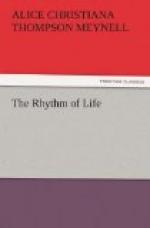Nevertheless Lowell was no poet. To accept his verse as a poet’s would be to confess a lack of instinct, and there is no more grievous lack in a lover of poetry. Reason, we grant, makes for the full acceptance of his poems, and perhaps so judicial a mind as his may be forgiven for having trusted to reason and to criticism. His trust was justified—if such justification avails—by the admiration of fairly educated people who apparently hold him to have been a poet first, a humourist in the second place, and an essayist incidentally. It is hard to believe that he failed in instinct about himself. More probably he was content to forego it when he found the ode, the lyric, and the narrative verse all so willing. They made no difficulty, and he made none; why then are we reluctant to acknowledge the manifest stateliness of this verse and the evident grace of that, and the fine thought finely worded? Such reluctance justifies itself. Nor would I attempt to back it by the cheap sanctions of prophecy. Nay, it is quite possible that Lowell’s poems may live; I have no commands for futurity. Enough that he enriched the present with the example of a scholarly, linguistic, verbal love of literature, with a studiousness full of heart.
DOMUS ANGUSTA
The narrow house is a small human nature compelled to a large human destiny, charged with a fate too great, a history too various, for its slight capacities. Men have commonly complained of fate; but their complaints have been of the smallness, not of the greatness, of the human lot. A disproportion—all in favour of man—between man and his destiny is one of the things to be taken for granted in literature: so frequent and so easy is the utterance of the habitual lamentation as to the trouble of a ‘vain capacity,’ so well explained has it ever been.
’Thou hast not half the power
to do me harm
That I have to be hurt,’




